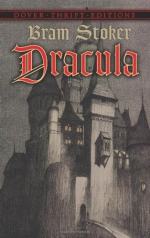We found Hildesheim in his office, a Hebrew of rather the Adelphi Theatre type, with a nose like a sheep, and a fez. His arguments were pointed with specie, we doing the punctuation, and with a little bargaining he told us what he knew. This turned out to be simple but important. He had received a letter from Mr. de Ville of London, telling him to receive, if possible before sunrise so as to avoid customs, a box which would arrive at Galatz in the Czarina Catherine. This he was to give in charge to a certain Petrof Skinsky, who dealt with the Slovaks who traded down the river to the port. He had been paid for his work by an English bank note, which had been duly cashed for gold at the Danube International Bank. When Skinsky had come to him, he had taken him to the ship and handed over the box, so as to save porterage. That was all he knew.
We then sought for Skinsky, but were unable to find him. One of his neighbors, who did not seem to bear him any affection, said that he had gone away two days before, no one knew whither. This was corroborated by his landlord, who had received by messenger the key of the house together with the rent due, in English money. This had been between ten and eleven o’clock last night. We were at a standstill again.
Whilst we were talking one came running and breathlessly gasped out that the body of Skinsky had been found inside the wall of the churchyard of St. Peter, and that the throat had been torn open as if by some wild animal. Those we had been speaking with ran off to see the horror, the women crying out. “This is the work of a Slovak!” We hurried away lest we should have been in some way drawn into the affair, and so detained.
As we came home we could arrive at no definite conclusion. We were all convinced that the box was on its way, by water, to somewhere, but where that might be we would have to discover. With heavy hearts we came home to the hotel to Mina.
When we met together, the first thing was to consult as to taking Mina again into our confidence. Things are getting desperate, and it is at least a chance, though a hazardous one. As a preliminary step, I was released from my promise to her.
MINA HARKER’S JOURNAL
30 October, evening.—They were so tired and worn out and dispirited that there was nothing to be done till they had some rest, so I asked them all to lie down for half an hour whilst I should enter everything up to the moment. I feel so grateful to the man who invented the “Traveller’s” typewriter, and to Mr. Morris for getting this one for me. I should have felt quite astray doing the work if I had to write with a pen . . .
It is all done. Poor dear, dear Jonathan, what he must have suffered, what he must be suffering now. He lies on the sofa hardly seeming to breathe, and his whole body appears in collapse. His brows are knit. His face is drawn with pain. Poor fellow, maybe he is thinking, and I can see his face all wrinkled up with the concentration of his thoughts. Oh! if I could only help at all. I shall do what I can.




